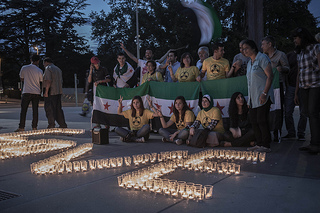Obama's Syria Remarks And The Line Between Rhetoric And Reality

Echoing the Aug. 30 sentiments of Secretary of State John Kerry when he first confirmed that over 1,400 Syrian civilians had been killed in a chemical weapons attack, the President implored the American people not to ignore such a gross violation of human rights and international law. Obama packed his speech with visceral imagery of children struck down and weapons that make “no distinction between soldier and infant.”
“When dictators commit atrocities, they depend upon the world to look the other way until those horrifying pictures fade from memory,” he nobly reminded us.
Except we look the other way all the time.
In the past two decades, how many unspeakable atrocities has the United States ignored, trivialized or downright walked away from? How many breaches of international human rights treaties have we let slide? How many human rights violations have we ourselves perpetrated? Have we forgotten so soon the abuse and torture of prisoners of war at Guantanamo and Abu Ghraib?
Despite what Obama’s rhetoric might incline us to believe, Assad’s chemical weapons attack isn’t the only mass atrocity taking place on the planet right now. As you read this, genocidal violence continues in the Darfur region of Sudan. In the eastern Democratic Republic of Congo, the deadliest conflict since WWII rages unchecked. And have we forgotten the hundreds of thousands of people estimated killed in Syria before Assad ever tapped into his chemical weapons supply?
So when it comes to Syria, what are we really after? In short, the chance to put a belligerent nation in its place where it counts—the War on Terror.
Obama mentioned terrorism plenty of times in his fifteen minute speech. In stating his case for a military strike, the President made it quite clear that allowing Syria to get away with its use of chemical weapons now would set a precedent of impunity for mass civilian violence that Al Qaeda and other terrorist organizations would seize upon:
“But al Qaeda will only draw strength in a more chaotic Syria if people there see the world doing nothing to prevent innocent civilians from being gassed to death.”
Assad’s chemical weapons attack is not the first human rights violation of its kind—but it’s the first that concerns the use of weapons of mass destruction in Al Qaeda’s neighborhood, and this Obama cannot abide. As our past actions in Afghanistan and Iraq have indicated, we are terrified of looking weak when terrorists might be watching.
What the President said in his speech was correct: America is not the world’s policeman. What is more, an intervention in Syria would not make us so.
America, understand what has transpired here tonight. An intervention in Syria has little to do with protecting Syrian lives.
President Obama has reaffirmed what we have known all along, but are too queasy to admit: the United States does not undertake military action for humanitarian purposes, nor do we consider it our job to do so. America’s well-oiled war machine is fundamentally self-interested, as plenty of political and foreign policy theorists will argue that it should be. As many times as Obama described child victims dying from sarin gas on cold hospital floors, the decision he makes will be for our children, not for Syria’s.
With the Assad regime’s confirmation this morning that it would be turning over its chemical weapons arsenal to international control, the credible American military threat Obama mentioned in his speech may very well have saved Syrian lives. But don’t think for a second that Syria would be on the table if we couldn’t answer the question of what’s in it for us. We’re still looking out for numero uno.
Reach Senior Opinion Editor Francesca Bessey here; follow her here.
Read more Neon Tommy coverage of Syria here.



